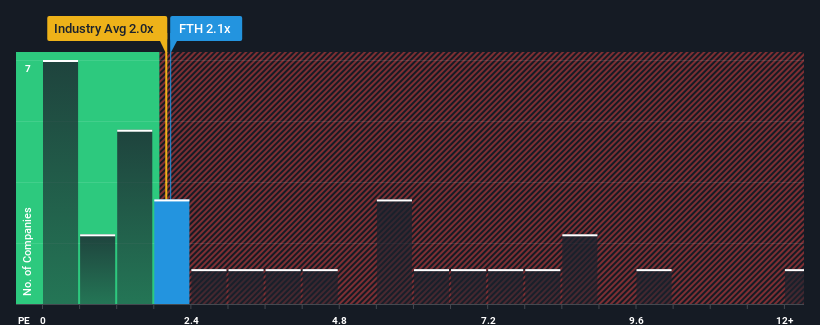The Fintech S.A. (WSE:FTH) share price has done very well over the last month, posting an excellent gain of 54%. Looking back a bit further, it’s encouraging to see the stock is up 34% in the last year.
Even after such a large jump in price, there still wouldn’t be many who think Fintech’s price-to-sales (or “P/S”) ratio of 2.1x is worth a mention when the median P/S in Poland’s Software industry is similar at about 2x. However, investors might be overlooking a clear opportunity or potential setback if there is no rational basis for the P/S.
Check out our latest analysis for Fintech

What Does Fintech’s P/S Mean For Shareholders?
With revenue growth that’s exceedingly strong of late, Fintech has been doing very well. Perhaps the market is expecting future revenue performance to taper off, which has kept the P/S from rising. If you like the company, you’d be hoping this isn’t the case so that you could potentially pick up some stock while it’s not quite in favour.
We don’t have analyst forecasts, but you can see how recent trends are setting up the company for the future by checking out our free report on Fintech’s earnings, revenue and cash flow.
How Is Fintech’s Revenue Growth Trending?
Fintech’s P/S ratio would be typical for a company that’s only expected to deliver moderate growth, and importantly, perform in line with the industry.
Retrospectively, the last year delivered an exceptional 108% gain to the company’s top line. The latest three year period has also seen an incredible overall rise in revenue, aided by its incredible short-term performance. Accordingly, shareholders would have been over the moon with those medium-term rates of revenue growth.
Comparing that to the industry, which is only predicted to deliver 15% growth in the next 12 months, the company’s momentum is stronger based on recent medium-term annualised revenue results.
With this information, we find it interesting that Fintech is trading at a fairly similar P/S compared to the industry. Apparently some shareholders believe the recent performance is at its limits and have been accepting lower selling prices.
What Does Fintech’s P/S Mean For Investors?
Fintech appears to be back in favour with a solid price jump bringing its P/S back in line with other companies in the industry Using the price-to-sales ratio alone to determine if you should sell your stock isn’t sensible, however it can be a practical guide to the company’s future prospects.
To our surprise, Fintech revealed its three-year revenue trends aren’t contributing to its P/S as much as we would have predicted, given they look better than current industry expectations. It’d be fair to assume that potential risks the company faces could be the contributing factor to the lower than expected P/S. At least the risk of a price drop looks to be subdued if recent medium-term revenue trends continue, but investors seem to think future revenue could see some volatility.
Don’t forget that there may be other risks. For instance, we’ve identified 3 warning signs for Fintech (2 make us uncomfortable) you should be aware of.
If you’re unsure about the strength of Fintech’s business, why not explore our interactive list of stocks with solid business fundamentals for some other companies you may have missed.
New: AI Stock Screener & Alerts
Our new AI Stock Screener scans the market every day to uncover opportunities.
• Dividend Powerhouses (3%+ Yield)
• Undervalued Small Caps with Insider Buying
• High growth Tech and AI Companies
Or build your own from over 50 metrics.
Have feedback on this article? Concerned about the content? Get in touch with us directly. Alternatively, email editorial-team (at) simplywallst.com.
This article by Simply Wall St is general in nature. We provide commentary based on historical data and analyst forecasts only using an unbiased methodology and our articles are not intended to be financial advice. It does not constitute a recommendation to buy or sell any stock, and does not take account of your objectives, or your financial situation. We aim to bring you long-term focused analysis driven by fundamental data. Note that our analysis may not factor in the latest price-sensitive company announcements or qualitative material. Simply Wall St has no position in any stocks mentioned.

